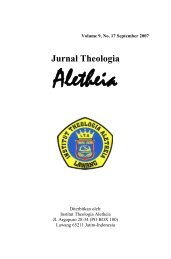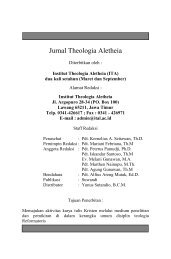download - Sekolah Tinggi Theologia Aletheia Lawang
download - Sekolah Tinggi Theologia Aletheia Lawang
download - Sekolah Tinggi Theologia Aletheia Lawang
Create successful ePaper yourself
Turn your PDF publications into a flip-book with our unique Google optimized e-Paper software.
72<br />
explain what God expects by way of obedience, he used the<br />
Apostles Creed in chapter two to explain the content of faith. Two<br />
kinds of faith are historical faith and trust. The first merely assents<br />
to the existence of God and Christ; it is unworthy of the name<br />
―faith,‖ since even the demons acknowledge as much. The second<br />
puts all its hope in God and lives with the assurance that what he<br />
promises he will do. It relies on his Word, and through it we<br />
receive what we ask, insofar as God judges that it is for our good.<br />
The creed has four parts and deals with each of the three persons of<br />
the Trinity and finally with the church as the people receiving the<br />
benefits of Christ. Calvin explains at length each part. He<br />
concludes the chapter with reflections on the companionship of<br />
hope and love with faith. Speaking of the other two, he says, ―If<br />
these are utterly lacking, however learnedly and elaborately we<br />
may discuss faith, we are proved to have none. Not because faith<br />
is engendered in us from hope or love, but because it can in no<br />
wise come to pass without hope and love forever following<br />
faith.‖ 82 Hope is the longing for that of which faith is assured.<br />
Love embraces him in whom one believes. The three are<br />
interdependent and nurture one another.<br />
Calvin‘s third chapter explains the life of prayer by<br />
examining the Lord‘s prayer. Thus, in the first three chapters of<br />
this first edition of The Institutes Calvin explores the three classic<br />
components of Christian catechesis: Decalogue, Apostles Creed,<br />
and Lord‘s prayer. The fourth deals with the two biblical<br />
sacraments: baptism and the Lord‘s supper. The fifth chapter treats<br />
the five false sacraments, demonstrating how they lack biblical<br />
basis and have been employed to shore up the sacramentalism<br />
which has enslaved the church to the hierarchy. And the last<br />
chapter explores the notion of Christian freedom as freedom from<br />
the yoke of the law, but as a spiritual liberation to serve God gladly<br />
and freely according to the Word. It is a freedom concerning<br />
things not specifically prescribed or proscribed in the Word to use<br />
them or not use them, according to the Spirit‘s guidance. Calvin<br />
discusses how this freedom relates to the true authority of the<br />
82 Calvin, Institutes of the Christian Religion—1536 Edition, p. 65.




